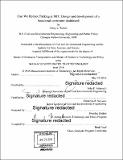Can we reduce parking at MIT : design and development of a functional commuter dashboard
Author(s)
Tucker, Corey L. (Corey Logan)
DownloadFull printable version (12.92Mb)
Alternative title
Can we reduce parking at the Massachusetts Institute of Technology : design and development of a functional commuter dashboard
Other Contributors
Massachusetts Institute of Technology. Department of Civil and Environmental Engineering.
Advisor
John P. Attanucci and Frederick P. Salvucci.
Terms of use
Metadata
Show full item recordAbstract
This thesis presents the design, development and initial implementation of a new commuter dashboard tool entitled AccessMyCommute for use by all MIT employees. This is the first in a series of new commuter benefit incentives that MIT will introduce during the 2015-2017 academic years to its employees in order to reduce parking demand and to increase campus sustainability. Previous research has suggested that both financial and non-monetary incentives can be effective at encouraging behavior change, and AccessMyCommute leverages that knowledge with the introduction of a number of non-monetary incentives including: real-time trip planning, carpool facilitation, and a leaderboard to exert social influence. The tool also provides a platform for introducing a variety of forms of financial incentives. Quality control and usability studies preceded implementation. Introduction of AccessMyCommute to the MIT community is documented, and a design for the first set of financial incentives is presented. The first set of financial incentives was conducted through the use of Point Programs in AccessMyCommute and all users were awarded points for their commutes based on levels of sustainability. Those points could then be redeemed for prizes including a small set-value or entries into lottery raffles for larger prizes. Initial results from the introduction of AccessMyCommute as well as the first point program suggest that in the absence of other incentives, particularly any disincentive to driving, commuters are unlikely to alter their mode. Point programs are effective as an incentive for commuters to log on to AccessMyCommute, but the number of employees participating is small and future work should aim to increase the number of participants. Finally, participation in the initial point program confirmed previous research that suggests that individuals exhibit riskseeking behavior in the face of uncertain gains. This information should be leveraged in future work with AccessMyCommute, particularly in conjunction with additional new commuter benefits and incentives to be offered by MIT in the next academic year.
Description
Thesis: S.M. in Technology and Policy, Massachusetts Institute of Technology, School of Engineering, Institute for Data, Systems, and Society, Technology and Policy Program, 2016. Thesis: S.M. in Transportation, Massachusetts Institute of Technology, Department of Civil and Environmental Engineering, 2016. Cataloged from PDF version of thesis. Includes bibliographical references (pages 98-102).
Date issued
2016Department
Massachusetts Institute of Technology. Department of Civil and Environmental Engineering; Massachusetts Institute of Technology. Engineering Systems Division; Massachusetts Institute of Technology. Institute for Data, Systems, and Society; Technology and Policy ProgramPublisher
Massachusetts Institute of Technology
Keywords
Institute for Data, Systems, and Society., Engineering Systems Division., Technology and Policy Program., Civil and Environmental Engineering.